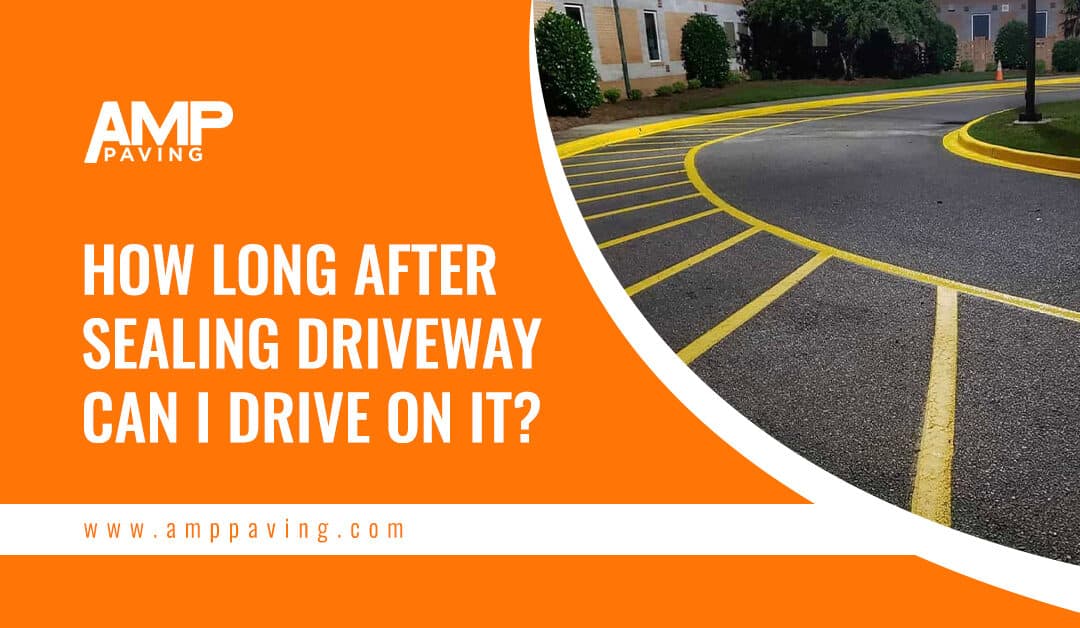You want to seal your driveway but worry it may take too long. You need to know how long after sealing the driveway you can drive on it. The last thing you want to do is seal coat and then ruin that fresh surface by driving on it too soon.
Knowing the right time to use your driveway after sealing can make all the difference in the longevity and appearance of your asphalt.
Timing is crucial in South Carolina, where weather conditions play a significant role. This article will guide you through how long you should wait before you hit that smooth new surface with your car.
How Long After Sealing Driveway Can I Drive On It?
So, you’ve taken the crucial step to extend the life of your driveway by sealing it. Great decision!
The next big question on your mind is probably, “How long do I have to wait before driving on my newly sealed driveway?”
The answer can vary, but a good rule of thumb is to wait at least 24 to 48 hours. This period allows the sealer to dry adequately, ensuring the substance bonds to the asphalt correctly.
Weather Conditions Matter
In South Carolina, we experience various weather conditions that can affect drying time. If it’s hot and sunny, the sealer will likely dry faster, perhaps within 24 hours.
On the flip side, if it’s humid or rainy, you might need to wait up to 72 hours before using your driveway. Always check the weather forecast before starting your sealing project to ensure you give it the best chance to dry effectively.
What Happens if You Don’t Wait
Ignoring the drying period can result in several issues. You risk smearing the sealer, creating tire tracks, and undoing all the hard work you put into the project. In the worst-case scenario, you could have to redo the whole sealing process.
Consult the Professionals
Don’t hesitate to ask your asphalt contractor if you’re unsure about the right time to drive on your sealed driveway. They can provide personalized guidance based on your circumstances.
By being patient and allowing the appropriate drying time, you’re doing your part to ensure your newly sealed driveway stays in tip-top shape for years.
Types of Driveway Sealer for an Asphalt Driveway
When it comes to sealing an asphalt driveway, you have several options, each with a drying process that may vary significantly.
The type of sealer you choose will depend on various factors, including your budget, desired durability, and how quickly you need to use the driveway again.
Here’s a breakdown of the most common types of asphalt sealers and their drying times.
Coal Tar Seal Coating
One of the most popular options for asphalt driveway sealer, coal tar sealers offer excellent resistance to oil and gasoline spills. Typical drying time for this type of sealer is around 24 to 48 hours.
However, it can emit strong fumes, so you’ll need to keep pets and children away until it’s completely dry.
Asphalt Emulsion Sealers
Eco-friendlier than coal tar, asphalt emulsion sealers are another excellent choice. They generally require a longer drying time, often around 48 to 72 hours.
One such innovative and environmentally friendly product is Pitch Black Asphalt Emulsion Sealer. Pitch Black® is non-toxic, non-flammable and the perfect eco-friendly alternative to coal tar. No Solvents. No Petroleum Distillates (i.e. Kerosene, Gasoline, Diesel). Lab tests prove that Pitch Black® has 0.00% PAHs (Polycyclic Aromatic Hydrocarbons). You can see the official USGS lab test results on CoalTarFreeUSA.com. (1)
These sealers often provide a more natural appearance, keeping the original look of your driveway.
Acrylic Seal Coating
If you’re looking for the fastest drying time when sealing an asphalt driveway, acrylic sealers are quickly dry. The curing process makes asphalt pavements ready for foot traffic in as little as 4 to 6 hours and for vehicle traffic within 12 to 18 hours.
As an asphalt sealer, acrylics offer excellent UV protection but tend to be more expensive than other options. Depending on how long your entire driveway is, you may want to consider this type of seal coat.
Oil-Based Sealers
Oil-based sealers offer deep penetration and are known for their durability. However, they have the most extended curing process, requiring you to stay off the driveway for up to four days.
These sealers are less commonly used for residential driveways because of their extended drying period and higher cost.
Seek Advice from the Pros
If you’re still uncertain about which sealer to choose based on drying times, it might be beneficial to consult with an experienced asphalt company. They can offer personalized recommendations based on your specific needs and driveway conditions.
The Process of Applying Asphalt Sealer to Your Driveway
So you’re considering sealcoating your driveway, but what does that process actually involve?
Let’s break it down step-by-step so you know exactly what to expect.
Clean and Dry the Surface
The first and most critical step in sealcoating is ensuring your driveway is completely clean and dry. Any existing oil, grease, or other contaminants can prevent the sealer from bonding properly. Removing loose debris is also crucial before it’s time to apply sealer.
The pros tackle this issue using a chemical deoxidizer that eliminates these elements.
Mechanical Cleaning
Once the initial cleaning is done, pro asphalt contractors bring out the heavy machinery to ensure no spot gets overlooked. This includes using broom trucks, blowers, and specialized crack-cleaning tools.
These machines scrub and clean the surface to guarantee that it’s primed for the sealer.
Applying the Sealer
After the surface is squeaky clean, it’s time for the main event—applying the asphalt sealer.
The pros use state-of-the-art equipment to ensure a smooth and even application. This crucial step locks in the longevity and appearance of your driveway.
Following this meticulous procedure sets your driveway up for years of durability and curb appeal. So when you decide to go ahead with sealcoating, you’re making a wise investment in the future of your asphalt.
Keeping Your Newly Sealed Driveway Looking Good
Sealcoating offers a robust defense for your asphalt driveway, regardless of its age. This protective layer keeps harmful elements like UV rays, car fluids, and rainwater from penetrating the base layer of your asphalt.
By preventing these contaminants from breaking down the material, sealcoating keeps your driveway in top condition. Not only does sealcoating act as a safeguard, but it also extends the lifespan of your driveway and minimizes future repair costs.
A well-sealed asphalt can last up to seven more years on average and is more resilient against cracks. Proper sealcoating adds years to your driveway, making it a smart, cost-effective choice.
Plan for sealcoating routine maintenance every two to three years to ensure your driveway stays in peak condition.
Consistent upkeep with quality sealcoating drastically improves the longevity of your asphalt, making it a savvy alternative to costly repaving projects.
Our Experienced Asphalt Technicians Know South Carolina Asphalt
At AMP Paving, we understand that the asphalt needs of South Carolina are unique. Our climate presents its own set of challenges, from hot summers to occasional heavy rainfalls. With years of experience in the industry, our team of knowledgeable technicians is adept at tailoring our asphalt services to meet the specific demands of our region.
Our professionals understand the nuances of asphalt composition and have a solid grasp of the state’s weather patterns and how they can affect your driveway. Whether you’re looking for a quick repair or a full sealcoating job, we offer a range of services designed to withstand South Carolina’s unique climate conditions.
Don’t leave the care of your driveway to just anyone. Trust the people who know South Carolina asphalt services inside and out. With AMP Paving, you’re not just getting a service but investing in quality, durability, and local expertise.

